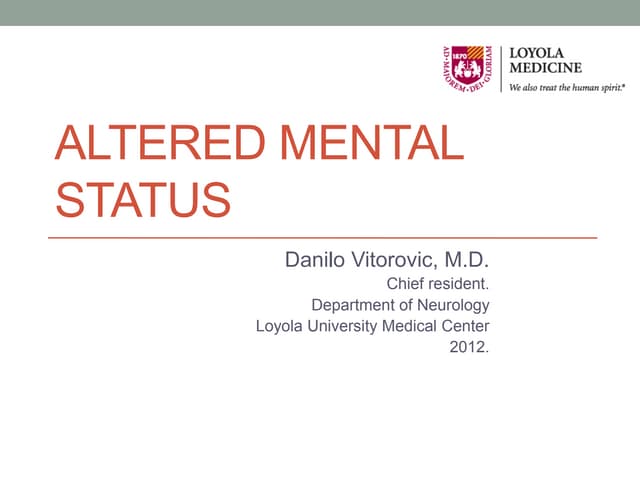


Lethargic: reduced level of alertness with decreased interest in the surrounding environment. Somnolent: sleepy, responding to stimuli only with incoherent mumbles or disorganised movements. Hyper-alert patients can be verbally and physically threatening, restless, and/or aggressive.Ĭonfused: disorientated bewildered, and having difficulty following commands.ĭelirious: disorientated restless, hallucinating, sometimes delusional.

Hyper-alert: heightened arousal with increased sensitivity to immediate surroundings. Some of the more common terms include: Young J, Inouye SK. Abnormal state of consciousness is more difficult to categorise, and many terms are used. Normal state of consciousness consists of either the state of attentiveness in which most people function while not asleep, or one of the recognised stages of normal sleep from which the person can be easily aroused. Etiologies and delirium rates of elderly ED patients with acutely altered mental status: a multicenter prospective study. In this group, infection and neurological disease were the most common aetiologies. Mortality was almost 25%, and the mortality rate increased if AMS lasted longer than 3 days. 2012 3(4):270-7.Īnother observational study reported that over half of adults aged over 65 years with AMS had delirium. Evaluation and treatment of altered mental status patients in the emergency department: life in the fast lane.

Acute alcohol intoxication, infection, and metabolic abnormalities were other common causes of AMS. Thirty-five percent of cases had a neurological cause (e.g., stroke, traumatic brain injury, or seizures). EpidemiologyĪn observational study conducted in the accident and emergency department found that an acutely AMS was the primary reason for the visit for about 1% of all adult patients and 2.4% of older adults.
#ICD 10 FOR ALTERED MENTAL STATUS PLUS#
However, more frequently, patients exhibit altered levels of consciousness plus cognition: for example, with delirium, a relatively common and sometimes fatal cause of AMS. 2016 Aug 34(3):649-65.įor example, patients with meningitis may have impaired consciousness (i.e., altered sensorium, decreased attentiveness) with intact cognition, whereas patients with dementia may have a normal level of consciousness with impaired cognition. Fundamentally, mental status is a combination of the patient's level of consciousness (i.e., attentiveness) and cognition (i.e., mental processes or thoughts) patients may have disorders of one or both. Given the vagueness of the term, it is imperative to understand its key components before considering a differential diagnosis. Altered mental status in older patients in the emergency department. Altered mental status (AMS) is a general term used to describe various disorders of mental functioning ranging from slight confusion to coma.


 0 kommentar(er)
0 kommentar(er)
